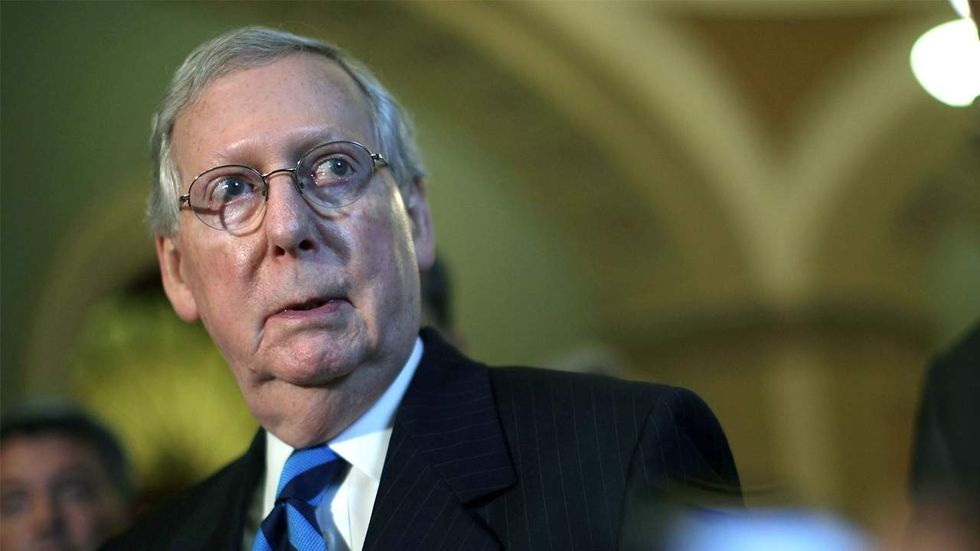
Reports indicate the Senate Better Care Reconciliation Act's fate depends on the support of one man: Sen. Mike Lee (R-Utah). (Alex Wong/Getty Images

Sens. Rand Paul (R-Ky.) and Susan Collins (R-Maine) have announced they won’t support the Better Care Reconciliation Act, Senate Republicans’ plan to replace Obamacare. Sen. Ted Cruz (R-Texas), citing improvements in the latest draft of the bill and the inclusion of a modified version of the Cruz-Lee Consumer Protection Option, has indicated he will vote for the BCRA.
With most of the Senate having already made up its mind on the legislation, conservative Sen. Mike Lee (R-Utah) remains as one of the few who have yet to weigh in, posting on Twitter on Thursday he’s “withholding judgment” on the newest version of the legislation.
I am withholding judgment and look forward to reading it. 2/2
— Mike Lee (@SenMikeLee) July 13, 2017
If Lee chooses to join Paul, who has announced he can’t support this version of the legislation because it keeps too much of Obamacare in place, and Collins, who isn’t voting for the BCRA because she believes there are too many cuts to government funding, then the bill will effectively be dead, regardless of whether other Republicans stand.
On Thursday, when the latest draft of the BCRA was released, it appeared to many as though the addition of the modified Cruz-Lee amendment would be enough to sway both Cruz and Lee, but Lee quickly announced that he wasn’t nearly as sold as Cruz.
At issue is the modification made to the amendment, which the Senate leadership added to the bill at the last minute after Cruz reportedly approached them with a compromise. The original version of the amendment supported by Lee would have allowed health insurance companies to sell any policies they want so long as they offered at least one policy that complied with most Obamacare mandates, including the pre-existing conditions clause and community-rating requirement, which now forces insurers to sell people of the same age policies at the same price regardless of health status (with only a few exceptions).
Lee and Cruz believe this amendment would make health insurance significantly more affordable for many people without pre-existing conditions while still ensuring those with pre-existing conditions had at least one option to purchase health insurance.
The newest version of the amendment keeps that basic framework intact, but makes one important revision: Rather than allow insurers to put those purchasing Obamacare-compliant health insurance plans (these people will most likely have pre-existing conditions) and those purchasing every other type of plan, many of which would be cheaper than the Obamacare-compliant plans, in two different risk pools, all plans would have to be placed in the same risk pool.
What this means is that insurance prices across both plan types would have to be increased by the same percentage, if an insurer chooses to increase prices at all. While this might seem like a relatively minor issue; it’s not. If insurers are required to increase prices at the same rate, the cost of insuring people with pre-existing conditions will continue to be heavily subsidized by people in the market who have maintained continuous coverage, one of the key reasons health insurance prices have grown so dramatically in recent years. Health insurers would also be forced to apply two totally different models to the same risk pool, which some say would be incredibly difficult and costly to accomplish.
By forcing rates for newer, cheaper plans to increase at the same percentage as Obamacare-compliant plans, insurance companies’ risk would be spread out more evenly amongst consumers of every plan type, allowing people with pre-existing conditions to have access to more affordable plans. However, this model would also make it more likely insurance companies or their competitors would constantly create newer, cheaper plans to lure healthier patients away from their current plans as they become more expensive, creating instability in the system over the long run.
Lee has offered no hints as to what his future decision on the legislation will be, but one thing seems almost certain: The fate of the Better Care Reconciliation Act rests in his hands.
Justin Haskins